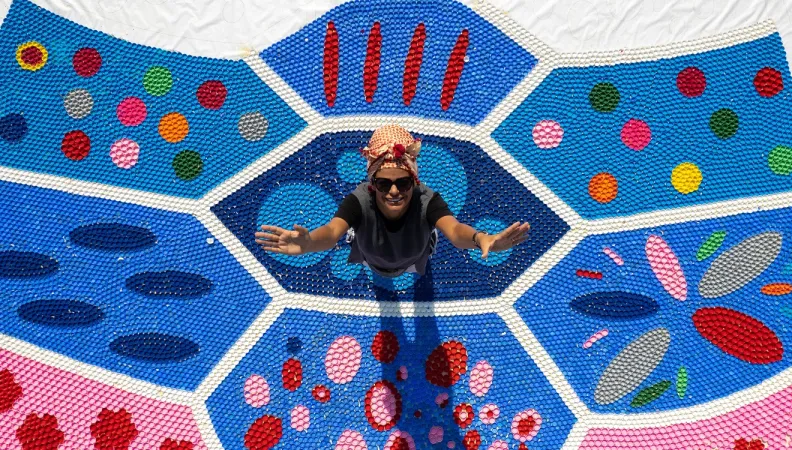Share the page
Can Art be a Vehicle for Development? The Answer lies in 3 Projects
Published on

The arts play an increasingly important role in development, a strategy that AFD has been involved in since 2018. AFD backs a range of projects, involving music, dance and other disciplines in an effort to broaden access to the arts and facilitate dialogue. In the approach to “Creation Africa” in Paris on 6 to 8 October - a forum for creative actors working in the arts, from cinema to virtual reality - we take a closer look at three projects that use art as a vehicle for development.
Originally published in April, this article was updated on 5 October, 2023
Music, theater, cinema, dance, radio, video games: the range of artistic possibilities is endless, not least when it comes to using the arts to promote positive social change. In 2018, AFD took on a new mission to support cultural and creative industries (CCI) in the countries where it operates.
“We believe that this sector has a role to play in creating social cohesion, access to employment, and inclusive local development,” says Gaëlle Mareuge, CCI project manager at AFD. “Since 2021, we have also been working, through cultural or artistic activities, to maximize the impact of the projects we fund."
Beyond the cultural and creative industries, the arts help activate emotional intelligence, a driving force for individual and collective transformation. "With the necessary conditions, the arts take the form of a new language that complements the technical expertise that underlies any development dynamic," said Tiphaine de Mombynes, Manager of AFD’s Metis Arts and Development Fund.
MAKING ART ACCESSIBLE via "Accès Culture"
Implemented in partnership with the Institut Français, the Accès Culture program finances cultural micro-projects in Africa that have a profound social impact on people who are the least likely to have access to culture and art. The first iteration of the program, which ran from 2020 to 2023 with a budget of €3 million, supported 92 projects in 17 areas - circus, film, music, photography - in 29 countries. Over 46,000 people have benefited.
In Cameroon, the Septen-Crions project, led by the associations Grand Slam National and Universlam, mobilized students in the cities of Maroua, Garoua, and Ngaoundéré for slam competitions on the theme of violence against women and girls. It has raised awareness among 900 young people.
Accès Culture also aims to strengthen collaborations between French and African cultural operators, as well as to document the impact of culture on social bonds through a research-evaluation program. The second edition, implemented until 2026, made it possible to select 30 new winners.
TANBOU: A PLACE FOR CREATIVITY AND DIALOGUE
Launched at the end of 2022 and financed with €3 million by AFD, the Tanbou project aims to contribute to job creation and the restoration of social cohesion in Haiti by creating an autonomous cultural space: the Fabrique des Arts (or “making of art.”) This will create a secure common space for creativity, multidisciplinary representation, training, free expression and dialogue.
In the video below, be sure to select "English subtitles" in the Youtube settings.
Art sector stakeholders will also have the opportunity to conduct social and artistic projects as part of an incubation program to be offered by the Fabrique. These projects will be partly focused on the Port-au-Prince neighborhood where it is located, thus promoting its local integration.
METIS: WHERE EMOTION MEETS TECHNIQUE WITHIN A DEVELOPMENT DYNAMIC
The Metis Art and Development Fund, set up by AFD in 2021, offers development operators (donors, NGOs, private operators) the opportunity to open their doors to artists to enhance their work in particular and development in general.
In 2023, the Metis “SlamUnity” initiative was developed with the National Institute of Social Work (INTS) in Congo, where inequalities have been growing for ten years. Slam artist Mariusca Moukengue trained INTS students, trainers and beneficiaries in the practice of slam poetry.
By sharing their experiences, their dreams and their fears, they saw the strength of this approach to fight against social injustices, prejudices and all forms of exclusion. Faced with the success of the initiative, the director of INTS decided to integrate slam into the center's training course.
In 2022 in Lebanon, the Khalas Plastique initiative financed by the Metis Fund mobilized more than 2,000 children and young people around the Lebanese visual artist Caroline Chaptini. Together, they built a giant metal turtle with a belly full of plastic bottles and a shell made of multi-colored corks. It was built on a public beach and the project included awareness-raising sessions and workshops in 12 schools around the country.
“It's a way to create new spaces for dialogue, to bring artists into developing territories in contact with the people," explained Tiphaine de Mombynes. “It’s an emotional experience where artistic achievements inspire people to take action on the development issues that they choose to address together."
In 2021 in Mexico, where AFD has been strengthening public environmental policies for over 15 years, the artist Priscila Martinez, for example, spent several weeks in a neighborhood on the outskirts of Guadalajara. In close collaboration with the inhabitants of the district, she created a mural on a wall adjacent to an abandoned site, which focuses on biodiversity and local themes. This initiative reinforced the residents' knowledge of environmental issues, while facilitating dialogue with the public authorities on the future of the abandoned site.
The Metis initiative funds an average of 10 projects each year. Over the past two years, 60 artists have spoken to 5,000 people in 26 countries, focusing on topics such as the environment, security, coexisting, and gender. Each project reinforces the conviction that the arts are an indispensable tool for development.
